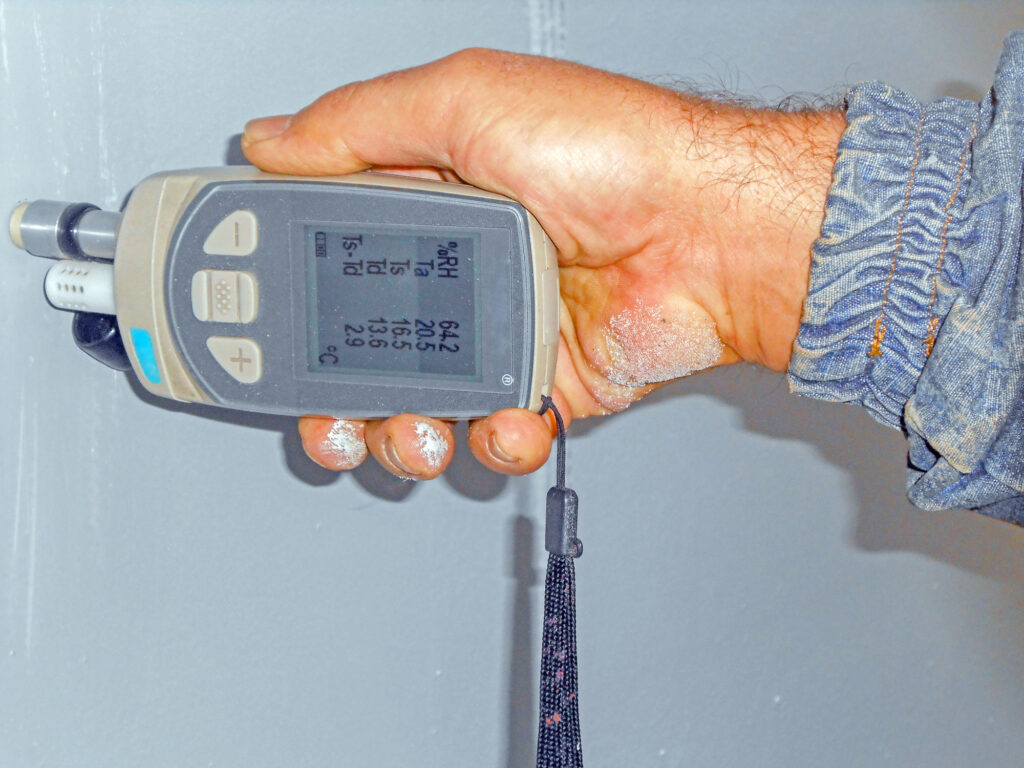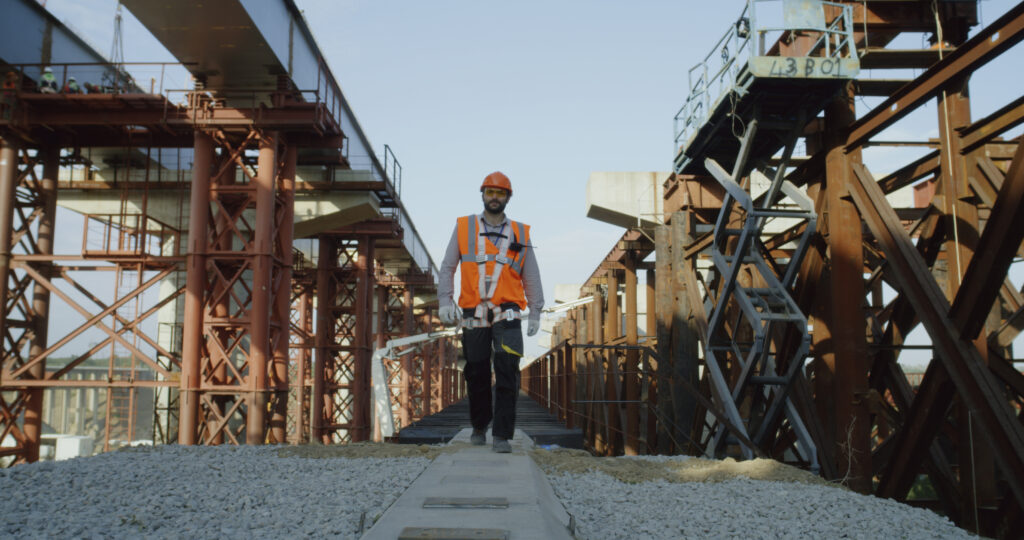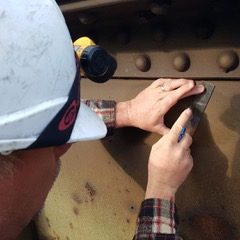Climate plays a crucial role in the successful application of industrial coatings. Numerous instances of coating failure have been linked to coatings applied when climatic conditions weren’t within the specified range. At Toronto Industrial Painting, an AMPP Level 3 certified surface inspection company, we recognize the importance of accurately measuring Relative Humidity and Dew Point temperatures in the field to prevent such failures.
Understanding Relative Humidity and Dew Point
Relative Humidity (RH) is the measure of how much moisture is in the air compared to the maximum amount of moisture the air could hold, given in percentage terms. Dew Point temperature is the temperature at which the air becomes fully saturated or reaches 100% RH. As a general rule, most project specifications require an RH below 85% and a minimum 5°F difference between the surface temperature and the Dew Point.
However, accurate measurements become increasingly important when the Humidity is near 85% (or the specified requirement) and the Dew Point/surface temperature spread is about 5°F.
Related: Understanding the Difference Between Quality Assurance and Quality Control
Measuring RH and Dew Point: Methods and Accuracy

There are two fundamental methods of measuring RH and Dew Point temperatures in the field, as outlined in ASTM E 337, Standard Method for Measuring Humidity with a Psychrometer. The traditional method employs a sling psychrometer, while modern practices favor electronic meters.
Sling psychrometers, used extensively by meteorologists, are generally considered to offer the most accurate method of determining RH and Dew Point. However, even the best psychrometers can expect an error range of 5% to 7%, and those typically used on coating projects may see even greater errors.
These devices measure two parameters – Dry Bulb (DBT or ambient temperature) and Wet Bulb (WBT) temperatures. WBT measures the temperature that results from evaporation, and is directly related to RH. The difference between the wet bulb and dry bulb temperature provides a measure of atmospheric humidity.
Enhancing Accuracy with Electronic Meters and Proper Procedure
Despite the traditional usage of sling psychrometers, we strongly recommend using electronic meters for optimal accuracy. If a sling psychrometer is used, certain steps should be followed to minimize potential errors:
- Ensure the thermometers are reading correctly by inspecting and calibrating them.
- Store the thermometers properly between uses to prevent heat-induced errors.
- Check the condition of the wick – it should be clean, white, and flexible. When possible, use distilled water and replace the wick if it becomes discolored or hard.
- When taking readings, follow a specific procedure, such as facing the wind if present and rotating the sling psychrometer at about 2 revolutions per second for about 90 seconds.
- Check readings in the area to be painted and compare dry bulb readings before and after the process to ensure consistency.
At Toronto Industrial Painting, our certified coating inspection professionals are equipped with the necessary knowledge and tools to conduct these critical measurements. Our commitment to quality and attention to detail help prevent expensive issues related to coating failures for our clients. Learn more about the three levels of NACE certification.
Are you looking for a pipeline inspector in Toronto? If you require expert advice or services in relation to industrial painting inspections, don’t hesitate to reach out to Toronto Industrial Painting. Quality isn’t just a part of our work, it’s our work’s very essence. Learn more from https://youtu.be/gxANBtRJE5g
In the industrial painting industry, two phrases commonly come up – Quality Control (QC) and Quality Assurance (QA). While they may sound similar, they have distinct meanings and functions that are crucial to the success of any coating project. As a professional, AMPP level 3 certified surface inspection company, Toronto Industrial Painting understands these differences intimately, offering complete coating inspection services for all industries. Let’s break down these concepts and their implications for coating inspection.
Quality Control: The Contractor’s Responsibility
Quality Control (QC) is primarily the responsibility of the person or the party executing the work, which in the case of the painting industry, is typically the contractor. Contractors may employ a coating inspector to ensure that their work complies with specified guidelines or, when such guidelines are absent, adheres to accepted industry standards for efficient coating practices.
However, a potential conflict can arise between maintaining Quality Control and meeting project deadlines or financial constraints. Even the best contractors might be tempted to compromise on quality to meet project timelines under client pressure. If a coating inspector is working under a contractor for quality control, this pressure can put them in a challenging position. As the measurements recorded in the QC process might be used in the future to ascertain the quality of work if a failure occurs, it is crucial for these figures to reflect the truth.
Related: What Do MPI-Certified Architectural Coatings Inspectors Do?
Quality Assurance: The Independent Inspector’s Role
Quality Assurance (QA), conversely, is usually undertaken by an independent entity. In industrial coating scenarios, this often falls on a third-party coating inspector. This process assumes that Quality Control has been executed and that the work has been approved for inspection by the contractor.
The QA inspector’s task is to verify that the work aligns with the project’s documentation and specifications. If a contractor doesn’t employ a QC specialist, the QA inspector takes on both roles, leading to increased responsibilities, especially if the work requires multiple rounds of inspections due to substandard quality.
Related: Understanding the inspections process
The Specialized Role of Toronto Industrial Painting
At Toronto Industrial Painting, our AMPP Level 3 certified coating inspectors specialize in performing detailed and unbiased Quality Assurance checks. Recognized by the Association for Materials Protection and Performance (AMPP), we bring a unique, highly qualified perspective to the job. Our three levels of certification – Level 1, Level 2, and Level 3 – underscore our commitment to delivering top-quality inspection services across all industries. We also offer consultation on quality assurance and control measures, making us a one-stop solution for all your industrial painting inspection needs.
In an industry where poor quality or hasty work can lead to expensive repairs and potential operational disruptions, our singular focus is to ensure the longevity and integrity of your assets. At Toronto Industrial Painting, quality isn’t an add-on – it’s woven into the very fabric of our ethos.
Toronto Industrial Painting is a leading player in the coating inspection industry with a remarkable history of professional services across various sectors. Our key competence is our AMPP Senior Certified Coatings Inspectors, recognized for their proficiency in third-party QA/QC, bridges, petroleum, pipe, paint, specifications, failure analysis, project estimation, nuclear facilities, tanks, and lead abatement.

Bridges are among the key infrastructures that benefit from our robust industrial painting services. A major component of this process is the surface preparation, application, and inspection of protective coatings on bridge steel, either in a shop or field setting. This article provides a succinct overview of these processes.
Understanding the Inspection Process
The coating inspection process is integral to bridge coating application. It encompasses several checks to ensure that the surface is suitable for coating and that the coating is applied properly. A thorough bridge coating inspector can help identify any potential issues that could undermine the coating’s longevity and effectiveness. As NACE Coatings Inspectors working in Toronto, Ontario, our team possesses the expertise and the meticulous eye for detail needed for such a critical job.
Related: Professional Coating Inspection Services in Southern Ontario
Surface Preparation
The longevity and effectiveness of a protective coating largely depend on the surface preparation. Surface preparation involves removing all foreign materials such as rust, mill scale, old paint, and other contaminants that could prevent the protective coating from adhering properly. It’s crucial to ensure that the surface is clean, dry, and roughened to enhance the coating’s adhesion and overall performance.
Application of Protective Coatings
Applying protective coatings on bridge steel is a procedure that requires precision, experience, and the use of the right products and equipment. Depending on the bridge’s location, exposure, and specific requirements, we select the most suitable coating to offer long-lasting protection against weathering, rust, and other environmental factors. Our team is skilled in utilizing a variety of application techniques, each designed to achieve optimal results.
Containment
Containment is a crucial aspect of the bridge coatings process. It serves to prevent the release of harmful materials, such as lead-based paint or rust particles, into the environment during surface preparation and coating application. At Toronto Industrial Painting, we take environmental protection seriously. We employ effective containment methods that comply with environmental regulations and best practices.
Field Safety Hazards
In a field setting, safety is paramount. Various hazards can arise, ranging from working at height, dealing with heavy machinery, exposure to harmful substances, to other potential risks. As an industry leader, we adhere to strict safety measures to protect our team and the surrounding environment. Our staff is fully trained and equipped to manage these risks, ensuring a safe and efficient working environment.
Related: What Do MPI-Certified Architectural Coatings Inspectors Do?
Adapting to Changing Weather Conditions
Weather conditions significantly impact the surface preparation and coating application process. Factors such as temperature, humidity, and precipitation can affect the coating’s curing process, adhesion, and durability. Our experienced team is adept at adapting to these changing weather conditions. We monitor and adjust our work practices as needed, ensuring that every job is completed successfully, regardless of the weather.
In conclusion, at Toronto Industrial Painting, we take pride in our team of AMPP Certified bridge coating inspectors who have demonstrated unparalleled expertise in the industry. We strive to provide excellent services that assure the longevity and safety of your infrastructure.
Whether it’s for a bridge, petroleum facility, nuclear tank, or lead abatement, we’re equipped to handle your industrial coating needs. Give us a call at 416.444.5092 and let us provide you with the quality service your project deserves. Learn more from https://youtu.be/6UhtMkowPeg
In the bustling landscape of the industrial coatings industry, Toronto Industrial Painting has carved a niche for itself as a trustworthy and skilled service provider. We boast an AMPP Senior Certified Coatings Inspector status, a testimony to our extensive experience and dedication in the field. Our expertise spans various industry requirements, including third-party QA/QC, bridges, petroleum, pipe, paint, specifications, failure analysis, project estimation, nuclear facilities, tanks, and lead abatement. As such, you can confidently entrust us with your industrial painting needs, reachable at 416.444.5092.

Pipeline Coating Inspector in Toronto
Before we delve into the importance of hiring a certified coating inspector, it’s crucial to understand the role pipelines play in our daily lives. They are the silent and robust infrastructure that transports the lifeblood of our economy – petroleum, natural gas, and various chemicals. Pipelines stretch across thousands of miles, both onshore and offshore, interlinking resources and markets. Therefore, their maintenance and preservation are paramount for continued and uninterrupted operation.
However, like any other industrial infrastructure, pipelines are exposed to various threats, the most significant being corrosion. If not adequately addressed, corrosion can result in the breach of pipeline integrity, causing failures that range from minor leaks to catastrophic explosions. The internal coating of pipelines is a preventive measure widely adopted in the industry to guard against this menace. Here, the role of a certified , such as one from Toronto Industrial Painting, becomes critical.
A coatings inspector from Toronto Industrial Painting ensures that the internal pipeline coatings are applied correctly, meeting the specified quality standards. An internal pipeline coating is typically applied in factory-coated 40 ft (12 m) pipe sections, which are then transported to the project location and welded together onsite. A specialized robotic coating equipment is used to coat the pipeline’s internal field joints, followed by an inspection of the cured coating.
As highlighted in a recent World Pipelines article, technological advancements have enabled the use of such specialized robotic equipment for efficient and high-quality coating processes. This machinery can easily clean, coat, and inspect as many as 40 field welds in a single day, offering a level of efficiency that’s unparalleled in manual procedures.
Inclusion of this advanced, specialized robotic equipment in project specifications is crucial for effective planning and execution. These devices ensure a high-quality coated field joint when properly calibrated and seamlessly integrated with other elements of the project specification. Under the Association for Materials Protection and Performance’s (AMPP) qualification procedure (QP) program, certified pipeline coating inspectors like Toronto Industrial Painting using specialized robotic equipment can demonstrate quality process control, sound management procedures, and compliance with safety, health, and environmental regulations.
Legacy equipment, born out of robotic internal pipeline weld X-ray devices, had size constraints that necessitated pipeline owners to use a minimum of 8 in. pipe. However, the evolution of specialized robotic equipment has transcended these limitations. With quality monitoring of several metrics, pipelines as small as 6 in. can now be efficiently coated and inspected, expanding the scope of protective measures against corrosion.
Toronto Industrial Painting’s embrace of these technological advancements is evidence of our commitment to providing superior service. Coupling this technology with our AMPP Senior Certified Coatings Inspector, we promise a quality-controlled, efficient approach to internal field joint coatings. And we have employees that have all three levels of coatings certification. We diligently adhere to the AMPP’s QP program, ensuring quality process control, effective management procedures, and a rigorous adherence to safety, health, and environmental compliance.
Related: How do NACE and SSPC differ from each other? | Toronto Industrial
The future of the pipeline industry relies heavily on the utilization of specialized robotic equipment for coating procedures. And at Toronto Industrial Painting, we are well-equipped to cater to this future, combining our skilled manpower with innovative technologies to provide unmatched services.
We’re not just providing a service but also ensuring the longevity and functionality of your pipelines. By investing in our certified coatings inspection services, you’re safeguarding your assets and maintaining their value over a more extended period. Our work minimizes potential disruptions and expensive reparations, while also reducing environmental risks.
Our commitment to comprehensive quality control means that we continually measure, assess, and improve our work. We strive to ensure that each coating is applied correctly, that all equipment is in perfect working order, and that every process aligns with industry standards. To achieve this, our inspectors stay up-to-date with the latest technologies and industry practices, ensuring they’re always one step ahead.
Let’s not forget the environmental implications of our work. Our certified pipeline coating inspectors are trained to ensure all safety, health, and environmental protocols are strictly adhered to during every project. By keeping our standards high, we can minimize the ecological impact of our work and help create a more sustainable future for the pipeline industry.
Finally, our commitment to excellence extends to our customer service. We value open communication and will keep you updated on your project’s status throughout its duration. We believe in forging strong relationships with our clients, as trust and communication are fundamental to successful project completion.
In conclusion, pipelines are the arteries of modern industry. Like any other infrastructure, they need regular maintenance to function optimally. Toronto Industrial Painting, your pipeline coating inspector, is your reliable partner in this maintenance process. We employ advanced technology and dedicated expertise to ensure your pipelines stay healthy and productive for years to come. Remember, when it comes to industrial coatings, your integrity is our priority. Don’t hesitate to reach out to us at 416.444.5092 for your pipeline coating needs. Learn more from https://youtu.be/0c10zsS5MuQ
